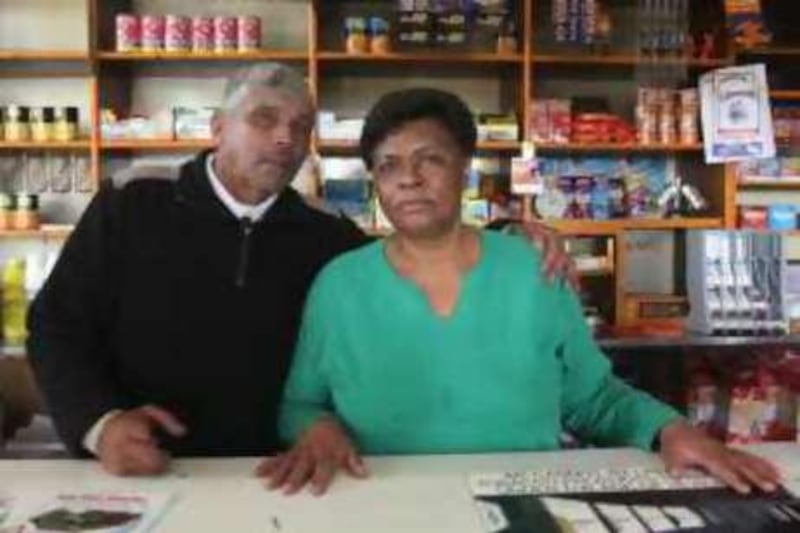JOHANNESBURG // Riverlea has a bucolic name, reminiscent of afternoon picnics at the waterside kissed by the rays of a summer sun. In reality, it is a tough township on the edge of Johannesburg, the kind of place where armoured-car security guards carry AK-47s rather than handguns - and with a spare magazine ready for immediate reloading. "It's bad here," said one of the guards, Tommy Hayes, lowering his weapon. "You can see the conditions they live in."
Riverlea, one of the poorest townships in South Africa, is riddled with drugs and crime - and the majority of the people who live there are coloured. About 4.5 million people in South Africa are classified as "coloured", about 10 per cent of the population. They include the descendants of mixed-race relationships going back centuries and labourers brought in from the Malay Archipelago during colonial times.
They were oppressed under apartheid, but not as severely as black Africans. And while the new South Africa has an acclaimed liberal constitution, declaring the country to belong "to all who live in it", many coloured people feel that they have been left out again, discriminated against by the ANC government's black economic empowerment policy that seeks to redress the legacies of past wrongs. Mr Hayes, 28, was unemployed for five years before finding his job as a security guard.
"Things are a little bit bad. If there's a job, they are going to give it to a black person first," said Trevor Steffensen, 61, who has a shop in Riverlea and whose grandfather was Danish. "We had white government; it's natural they would look first and foremost after the whites. Now we have black government who would first and foremost look after black people." Last week, a new group was formed, the Bruin Belange Inisiatief, or Brown Interests Initiative (BBI) to represent them.
"The origin is on the basis that people feel left out," said its chairman, Ivor Opperman, 52, a teacher in Cape Town. "Most of the people involved contributed, and not in small measure, to the struggle against apartheid and the remnants of colonialism. We were the victims, but we feel left out." Brown people, he said, were "black enough to struggle for liberation but not black enough to share in the spoils of the country. Let's be honest about what's happening: it's discrimination based on the colour of our skin".
He said applicants for jobs, tenders and student bursaries were losing out because they were "not particularly black enough". "You get a scorecard in order for you to win this or that. First is an African black woman, then an African black man, then African black disabled. There are different categories; that eliminates people." The perceived need for the organisation is clear evidence of how even 14 years after the end of apartheid and the creation of Nelson Mandela's "Rainbow Nation", race still dominates everything in South Africa.
Even the formation of a group to represent a particular ethnicity - although membership is open to all - is redolent of the past. "It's unfortunate that it's on the old apartheid lines, but we are doing this under an umbrella of democracy," Mr Opperman said. "More and more people are mobilising along Xhosa, Zulu or Afrikaner lines. As soon as brown people have stood up over the years we are being racist. That's a misrepresentation.
"We are not saying we want a special place. We are almost like foreigners in our country. It's our country, just as it is the black man's country, the white man's country, the yellow man's country." Hannah Botsis, of the South African Institute of Race Relations, said the feeling that coloured people were discriminated against "does hold some merit". "It becomes more and more acutely felt the more virulent policies around affirmative action become," she said, pointing out that if such measures were based on economic need, rather than race, the issue would be greatly defused. "We are still trapped in these racial identities," she added. "It's difficult to find a way to let go of race entirely when it was the biggest thing that counted for or against you."
The founding of the BBI has not met with universal approval. Writing in South Africa's Times newspaper, Jonathan Jansen, an academic and commentator, described the BBI as a "pathetic group of men who try to resurrect 'coloured identity' in order to 'cash in'. Bergies [street beggars] in suits, I call them, with their black economic empowerment trolleys. Just about everybody is trying to 'cash in' on the new South Africa at the expense of other people."
In Riverlea, Mr Steffensen's wife, Caryl, 62, who has Scottish ancestry, said coloured people had to stand up for themselves instead of blaming others. "We have got to look forward and say 'I have got to start doing it for myself and my family'," she said. "It's hopeless going back and saying we were discriminated against by the whites and now by the blacks. It doesn't matter them saying everybody is equal, it's going to be there forever. In everybody's eyes I'm a coloured."
@Email:sberger@thenational.ae





